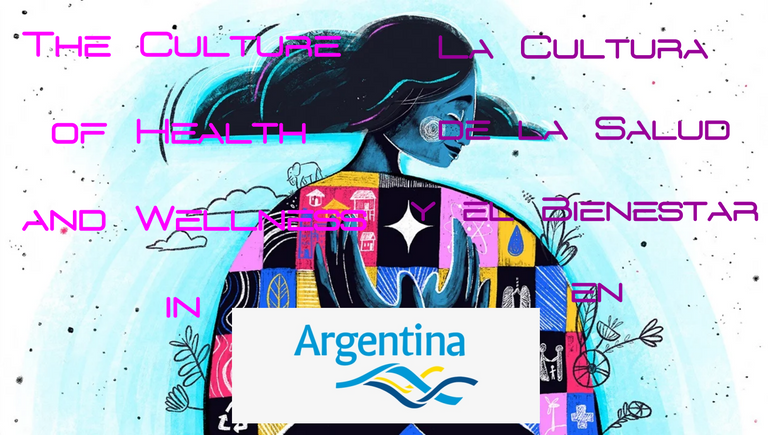
Health and wellness in each country are two topics that generally go rather unnoticed in the central themes of social networks, TV and other media, except in certain circumstances such as the World Health Day, Environment Day, etc.
The Covid-19 pandemic brought this issue to the forefront and then, as always happens, it disappears, losing visibility.
Today I propose to revive this idea by saying how the country we live in contributes to the health of its citizens.
How your country contributes to the health of its citizens.
Historically, Argentina has been a country in which the Ministry of Social Welfare, which has changed its name through the different political periods the country has gone through in the last decades, has acted as a policy in defense of the health and welfare of the inhabitants. In some periods of our recent history, it has even been said that it is the most important ministry, even more important than the Ministry of Economy.
This true and proper culture of health, not only including the inhabitants of the most vulnerable sectors, but also covering the population in general, from the prenatal period - currently there is a plan in force that comprehensively covers the health of children in their first thousand days of life -, through the protection of childhood, adolescence and youth with integrated plans of education and health even up to university age, has been carried out systematically.
The elderly sector (retirees and pensioners) has also always been the object of protective measures for their health, ranging from the granting of free medicines (not as a handout but as a regulated health policy in general) to medical and health centers dedicated exclusively to the elderly.
The measures that governments have adopted in recent years, sometimes questioned in the economic field according to the political profile with which it is analyzed, have usually found enough coincidence in the protection of the health of the inhabitants.
Free hospitals, clinics and sanatoriums, which have agreements with most of the social works that manage the national health system, allow the population to be almost never left uncovered as regards the protection of their health, even when high complexity treatments are required.
What measures do citizens take to keep their personal environment healthy in order to go out?

In Argentina there is a real fanaticism for hygiene. Showering in summer two or three times a day is quite common - at least for those who can do it at home - and, anyway, one shower a day is almost the norm to respect, even in the cold periods of the year.
One of the things that struck me the most during my long stay in Europe, where although the inhabitants are very addicted to cosmetics and perfumes, it is relatively rare to find people who take a shower every day. This does not mean that they do not respect the basic principles of human hygiene, but that they do not wash their bodies as they do in my native country.
What does your culture believe in to achieve adequate health and wellness for your people?
In Argentina since (almost) time immemorial - at least as far back as I can remember - there have always been two pillars on which the very structure of society has been based: education and health, both free and accessible to any inhabitant regardless of his or her economic condition.
Just as it has historically been affirmed that all people have the right to education, including university education, an analogous principle has also been upheld for their health and well-being. Including in the same the concept of gratuity.
Sometimes the intervention of external monetary agencies has tried to limit this function by arguing that excessive public spending is the main obstacle to putting the country's accounts in order. And some governments have accepted these objections and have limited or tried to limit these fundamental principles of which I have spoken to you in the previous paragraph.
However, they have been short-lived, either because of social pressure or because of agreements that have gradually reestablished that social order based on equity and justice.
The incorporation of food from organic crops is a constant and growing trend in recent years, especially in the production of fruits and vegetables on a smaller scale, in the so-called farms of northwestern Argentina, in contrast to the monoculture that reigns supreme in the pampas plains where cereals (wheat, barley, rye) and oilseeds (corn, sunflower, soybean) follow planting and pest control criteria that are totally out of harmony with the environment and the health of the population in general.
The use of excessively potent fertilizers, with a high toxic content of glyphosate, means that most of these foods arrive genetically modified on supermarket shelves. Foods obtained from genetically modified organisms (GMOs) are absolutely prohibited by the European Union, but in my country there is still no official regulation prohibiting their use and consumption.
Organic farms, orchards and organic farms -very developed in the southern part of the country in the so-called Patagonia- contribute to a healthy and healthier life since, due to the geographical conformation of the land, the cultivable area is scarce, a lot of work is done in nurseries and, consequently, it is not profitable for monoculture, which also has its high fixed costs of implementation, to intervene.

La salud y el bienestar en cada país son dos temas que generalmente pasan bastante desapercibidos en los temas centrales de las redes sociales, la televisión y otros medios de comunicación, salvo en determinadas circunstancias como el Día Mundial de la Salud, el Día del Medio Ambiente, etc.
La pandemia del Covid-19 puso este tema en primer plano y luego, como siempre ocurre, desaparece, perdiendo visibilidad.
Hoy propongo recuperar esta idea diciendo cómo contribuye el país en el que vivimos a la salud de sus ciudadanos.
Cómo contribuye su país a la salud de los ciudadanos.

Históricamente Argentina ha sido un país en el cuál el Ministerio de Bienestar Social que ha cambiado de nombre a través de los distintos períodos políticos por los que ha atravesado el país en las últimas décadas, ha actuado una política en defensa de la salud y el bienestar de los habitantes. Incluso -en algunos perídos de nuestra historia reciente- se ha llegado a decir que es el más importante de los ministerios, incluso del de Economía.
Esta verdadera y propia cultura de la salud, no solo comprendiendo a los habitantes de los sectores más vulnerables sino también abarcando a la población en general, desde el perído prenatal, -actualmente está en vigencia un plan que cubre integralmente la salud del niño en sus primeros mil dìas de vida-, pasando luego por la protección de la infancia, la adolescencia y la juventud con planes integrados de educación y salud incluso hasta llegar a la edad universitaria, se ha llevado a cabo en forma sistemática.
También el sector de la tercera edad (jubilados y pensionados) ha sido siempre objeto de medidas protectivas hacia su salud que van desde la concesión de remedios gratis (no como una dádiva sino como una política reglamentada de salud en general) hasta centros médicos y salutistas dedicados exclusivamente a los ancianos.
Las medidas que los gobiernos han adoptado en los últimos años, a veces cuestionadas en el ámbito económico de acuerdo al perfil político con que se analice, normalmente han encontrado bastante coincidencia en la protección de la salud de los habitantes.
Hospitales gratuitos, clínicas y sanatorios convencionados con la mayoría de las obras sociales que administran el sistema nacional de salud, permiten que la población no quede casi nunca descubierta en lo que se refiere a la protección de su salud, ni siquiera cuando se requiere alta complejidad en los tratamientos.
¿Qué medidas toman los ciudadanos para mantener su entorno personal saludable para salir?

En Argentina existe un verdadero fanatismo por la higiene. Ducharse en verano dos o tres veces por día es bastante común -al menos aquellos que pueden hacerlo en su casa- y, de cualquier manera, una ducha al día es casi la norma de respetar, aén en los períodos fríos del año.
En una de las cosas que más me llamó la atención en mi larga estadía en tierras europeas, donde si bien sus habitantes son muy adictos a los cosméticos y perfumes, es relativamente raro encontrar personas que se bañen todos los días. Lo cuál no quiere decir que no respeten los principios básicos de la higiene humana, sino que no efectúan el lavado integral del cuerpo como se hace en mi país natal.
¿En qué cree su cultura para lograr la salud y el bienestar adecuados para su gente?
En Argentina desde tiempos (casi) inmemoriales -al menos entendiendo por tales los que mi memoria recuerda- ha habido siempre dos pilares en los cuéles se ha asentado la estructura misma de la sociedad: la educación y la salud, ambos gratuitos y de acceso a cualquier habitante a prescindir de su condición económica.
Así como históricamente se ha afirmado que todas las personas tienen derecho a la educación incluso universitaria, también se ha sostenido un análogo principio para la salud y el bienestar de las mismas. Incluyendo en el mismo el concepto de gratuidad.
A veces la intervención de organismos monetarios externos ha tratado de limitar esta función aduciendo un gasto público excesivo obstáculo principal para poner las cuentas del país en orden. Y algunos gobiernos han aceptado estas objecciones y han limitado o tratado de limitar esos principios fundamentales de los cuáles les he hablado en el párrafo anterior.
Sin embargo han durado poco, ya sea por la propia presión social o por acuerdos que de a poco han restablecido ese orden social basado en la equidad y la justicia.
La incorporación de alimentos provenientes de cultivos orgánicos es una tendencia constante y en aumento en los últimos años, especialmente en lo que se refiere a la producción de frutas y hortalizas en menor escala, en las llamadas fincas del noroeste argentino, en contraste con el monocultivo que reina soberano en las planicies pampeanas donde los cereales (trigo, cebada, centeno) y las oleaginosas (maíz, girasol, soja) siguen criterios de siembra y combate de las plagas que no van absolutamente de acuerdo ni con el medio ambiente ni con la salud de la población en general.
El uso de fertilicidad excesivamente potentes, con un alto contenido tóxico de glifosato, hacen que la mayoría de estos alimentos lleguen genéticamente modificados a las góndolas de los supermercados. Los alimentos obtenidos a partir de organismos genéticamente modificados (OGM) absolutamente prohibidos por la Unión Europea, en mi país todavía carecen de una reglamentación oficial que prohiba su uso y consumo.
Las granjas, huertas y fincas orgánicas -muy desarrolladas en la zona sur del país en la llamada patagonia, contribuyen a una vida sana y más saludable ya que por la conformación geográfica de los terrenos la superficie cultivable es escasa, se trabaja mucho en viveros, y -en consecuencia- al monocultivo que también tiene sus altos costos fijos de implementación, no le resultable rentable intervenir.

Source images / Fuente imágenes:
Image / Imagen #1.
Image / Imagen #2.
Image / Imagen #3.


Sources consulted (my property) for the preparation of this article. Some paragraphs may be reproduced textually.
Fuentes consultadas (de mi propiedad) para la elaboración del presente artículo. Algunos párrafos pueden estar reproducidos textualmente.
| Argentina Discovery. |  |
|---|---|
| Galería Fotográfica de Argentina. |  |
| Viaggio in Argentina. |  |
Upvoted. Thank You for sending some of your rewards to @null. Read my last posts to make sure that BLURT burning is profitable for you. Before using this bot please make sure your account has at least 100 BP. Get more BLURT:
@ mariuszkarowski/how-to-get-automatic-upvote-from-my-accounts@ blurtbooster/blurt-booster-introduction-rules-and-guidelines-1699999662965@ nalexadre/blurt-nexus-creating-an-affiliate-account-1700008765859@ kryptodenno - win BLURT POWER delegationNote: This bot will not vote on AI-generated content
Thanks for the support to @ctime and other curators.